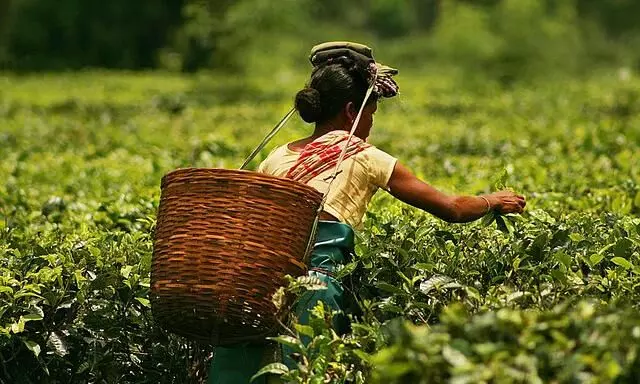
Assam tea workers earning between Rs137-Rs167 for over 15-20 years: Oxfam
text_fieldsA hike in wages and better working conditions for tea workers features amidst the electoral promises of both Congress and BJP ahead of the Assam's Assembly polls. Though both the parties have ruled the state for years, tea workers' conditions found little improvement and attention before the election campaign as shown by a report published by Oxfam International in October 2019.
The report titled 'Addressing the human cost of Assam tea' shows that despite working for over 13 hours a day, workers earn between Rs 137 - Rs 167. Some of the workers have been paid this amount for more than 15-20 years.
The document consists of research by the Paris-based Bureau for the Appraisal of Social Impacts for Citizen Information and in-depth interviews of 510 workers on 50 tea estates in Assam conducted by the Tata Institute of Social Sciences (TISS), Guwahati.
More than one-third of the worker households face debts since their daily expenditures exceeded income, as per the report. Many of the workers are unable to provide education to their children and afford their basic needs. According to local activists and organizations, workers required a minimum of Rs 330 per day in 2014 and Rs 400 in 2017 to cover their living costs.
The working conditions of tea workers lack proper sanitation and access to clean drinking water. In the 50 estates surveyed, the majority of them faced water problems. Because of the dirty water available, which is unfit for consumption, workers had to pay between Rs 60 and Rs 300 to get clean drinking water which they could not afford.
Many of the estates did not have toilets leading to the practice of open defecations. The employers did not adequately maintain the ones that had toilets.
Women bear the heaviest burden as they are paid the lowest despite equal working time as men. They are mostly employed to pluck tea, a labour-intensive job. According to the report, there were about 363 maternal deaths per 100,000 live births in Assam's tea estates in 2017, compared with 174 deaths for the rest of India.
Despite an increase in demand for premium brands of black tea in the market, plucking costs at tea estates have reduced. Labour costs increased only menially from Rs 23.6 per kg of tea in 2003 to Rs 24.68 in 2017.
The report further notes how supermarkets and tea brands in countries like Germany, Netherlands, UK and USA receive a major part of tea's market price, whereas workers receive only less than 10 per cent of the amount.






















